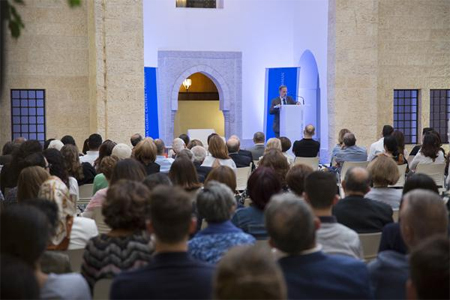
Amman - Afrasianet - The controversies sparked by US president Donald Trump to recognise Jerusalem as the capital of Israel and the ensuing reactions by Palestinian leaders in Ramallah and Gaza was the theme of a talk “The Trump Administration and Jerusalem”, conducted last Saturday by Rashid Khalidi at the Columbia Global Centres in Amman.
Khalidi, who taught at the Lebanese University, the American University in Beirut and the University of Chicago is currently a professor of Modern Arab Studies at Columbia University in New York.
“We should no longer be surprised or shocked by anything done by Donald Trump,” the scholar began, noting that Trump carried out the "most sweeping change" in the US policy on Palestine since 1947.
We are actually witnessing "a revolution" in the US policy towards Palestine, Khalidi stated.
Following a brief outline of Trump’s foreign policy, including that of the Middle East, the scholar said: "If you pay any attention to what has been happening in the United States, you’ll have noticed that there’s been no coherence in the policies of this administration towards any foreign policy issue, whether it has to do with Russia, China, Korea, trade, or the Middle East.”
It is because this administration has been characterised by, a deep division between the hard-line, erratic and very unconventional inclinations of the president and his closest advisers on the one hand, and the deeply conservative orientations of the major governmental branches and the individuals leading this bureaucracy on the other hand, Khalidi outlined.
"Looking carefully at the second group, you’ll find people who emerged from military and intelligence services, including Secretary of Defence General James Mattis, Secretary of State Rex Tillerson [now gone], White House Chief of Staff General John Kelly and former national security adviser H.R. McMaster. Three of the four are retired military officers, two of them are former Marines,” Khalidi underlined.
After firing Tillerson and McMaster, and with Kelly also on the exit door, Trump is replacing them with hardliners, the professor said.
Those establishment figures are opposed to by a group of ideologues, most of them foreign policy neophytes, neoconservatives dedicated to stalking the ultra-nationalistic inclinations of people who voted for Trump in November 2016, he claimed.
According to the scholar, Pompeo, Bolton and Haley belong to a group of radical ideologues and ardent Zionists.
"The US have been a status quo power preserving traditional alliances, as every president since WWII has attempted to maintain the US alliances and avoid adventurousness and excessive involvement in further armed conflicts," Khalidi said.
The gap between these two groups is most visible regarding the US/Middle East policy since Trump became president, he emphasised, adding that Trump personally intervened on the Palestinian issue against the advice of prominent bureaucracy members. "He did it to a much greater extent than any other president since Harry Truman," the scholar stressed.
"Everything related to Israel is not related to the foreign policy, it's essentially a matter of domestic policy," he highlighted, saying that Truman's decision to support partition and recognise Israel was met with opposition from all his advisers.
People whom Trump appointed to lead negotiations on the final status of East Jerusalem and Palestine — David Freidman and Jason Greenblatt — are not experienced diplomats, but "they are committed far-right Zionists who are long-term financial supporters of Israeli settler projects", according to Khalidi.
Moreover, the decision to move the US embassy to Jerusalem was ideologically motivated, driven by domestic considerations and largely by ideology rather than a foreign policy decision, he claimed.
"How should Palestinians respond to this seismic shift in the position of the US?," Khalidi asked.
As the weaker side, Palestinians cannot afford to be divided and must present a unified front, he stressed, saying: "There should be a redefinition of what Palestinian people want. There are new realities on the ground, new challenges, new threats and a new regional environment in 2018."
Furthermore, one necessary change of the Palestinian political discourse is to acknowledge that diplomatic strategy followed by PLO has been” fatally flowed”; the second is that the US cannot be a mediator and honest broker as it cannot be a neutral party, Khalidi underscored.
"United States will continue with this subversive approach unless and until the Palestinian national movement undertakes both mass, unarmed resistance and dedicated grassroots political and informational work outside of Palestine, especially inside the United States," Khalidi stressed.
Major shifts are already taken place in key sectors of the US public opinion regarding Palestinian question among the younger generation, among blacks and Puerto Ricans, among other minorities, among Arab Americans and Muslim Americans, and also, very importantly, within the considerable segments of Jewish American community, professor concluded.
May 08, 2018

